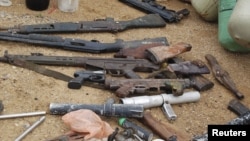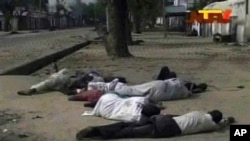ABUJA —
Amnesty International says actions taken by Nigeria's security forces to combat Islamist militant group Boko Haram are exacerbating the insurgency.
Officials deny allegations
In a new report released Thursday, the London-based rights group says security forces have committed rights violations, including arbitrary detentions, torture and extra-judicial killings.
The group says that, combined with atrocities carried out by Boko Haram, actions of the security forces create a cycle of violence and an "increasing climate of fear" in the country.
“We found that the very grave human rights abuses by the armed group Boko Haram are being met with serious human rights violations by security forces in their response to Boko Haram," said Lucy Freeman, Amnesty International's deputy director for Africa. "[This] has had a devastating impact on the human rights for the people who are caught in the middle.”
Freeman says security forces have responded to Boko Haram attacks by jailing hundreds of suspects without trials or access to lawyers or family members, sometimes leaving them chained nearly 24 hours a day.
Reports of the razing of private homes, she adds, indicate security forces have punished entire neighborhoods in retaliation for attacks led by militants.
"People were too afraid to even go to make a complaint," said Freeman, adding that her organization is calling for a witness-protection program to encourage civilians to come forward to report abuses by both Boko Haram and security forces. "If they went to try and see a loved one in detention, or if they went to collect the body of their relative, they were at times threatened or otherwise intimidated by the security forces.”
Amnesty's secretary general Salil Shetty has called upon high-level officials to protect the country's population from Boko Haram by acting within the rule of law, insisting the government must "counter terror with justice" by publicly denouncing the violence.
Constant danger
But Amnesty's report also notes that security forces on the front lines are in constant danger and many have been killed. At the heart of the cycle of violence, the research indicates, are political and economic problems that security forces can't solve.
According to private security officer Abba Buba, residents of Maiduguri, capital of northeastern Borno state and Boko Haram's original home base, are literally caught in the crossfire between security forces and militants, forcing them to turn to crime.
“He used to go to people to beg for money and now he comes to invest in his small business, [but] later they came and burned the same thing," he said of the impossible circumstances many civilians face. "So what are you telling that person? Are you not asking them to go into crime?”
Officials deny allegations
The Associated Press has reported that on October 8, Maiduguri-based security forces, enraged at being repeatedly targeted in guerrilla attacks by the extremist Islamist sect, allegedly fired upon civilians, killing 30.
Nigeria's Joint Task Force (JTF) denies the report, which also says soldiers burned shops and houses in revenge for a bomb attack. In a statement at the time, the JTF said there was "no recorded case of extra-judicial killings, torture, arson and arbitrary arrests by the JTF in Borno state."
A spokesperson for JTF team dubbed Operation Restore Order (ORO), was not immediately available for comment, but has previously denied human rights violations, saying any ORO members caught committing abuses is punished, and that security forces do not engage in unlawful killings, arson, torture or arbitrary arrests.
According to Amnesty, national security authorities have agreed to investigate the findings of their report.
An elusive enemy
Much about Boko Haram remains unclear, but the militants are believed to want to impose a strict form of Islamic law across northern Nigeria. The group is blamed for killing more than 1,000 people in northern and central Nigeria since 2010 in a series of attacks on schools, churches, newspaper offices, government buildings, and most frequently, security forces.
New York-based Human Rights Watch issued a report last month that also accused Nigerian security forces of engaging in abuses while battling Boko Haram.
- Abdulkareem Haruna contributed from Maiduguri.
Related video report by Selah Hennessy:
Related video report by Selah Hennessy:













